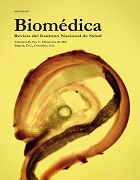Aedes aegypti anti-salivary gland antibody concentration and dengue virus exposure history in healthy individuals living in an endemic area in Colombia
Abstract
Introduction: Mosquito salivary proteins are able to induce an antibody response that reflects the level of human-vector contact. IgG antibodies against dengue virus (DENV-IgG) are indicators of previous exposure. The risk of DENV transmission is not only associated to mosquito or dengue factors, but also to socioeconomic factors that may play an important role in the disease epidemiology.
Objective: To determine the effect of the presence of Aedes aegypti mosquitos in different stages in households and the history of dengue exposure on vector-human contact determined by the level of anti-salivary protein antibodies in people living in a Colombian endemic area.
Materials and methods: A pilot study of 58 households and 55 human subjects was conducted in Norte de Santander, Colombia. A questionnaire for socioeconomic factors was administered and houses were examined for the presence of Ae. aegypti specimens in the aquatic stages. The level of DENV-IgG antibodies (DENV-IgG), in addition to IgG and IgM anti-Ae. aegypti salivary gland extract (SGE) antibodies (SGE-IgG, SGE-IgM) were evaluated by ELISA using blood collected in filter paper.
Results: We found a significant higher level of SGE-IgG antibodies in subjects living in houses with Ae. aegypti in aquatic stages. We also found a higher concentration of SGE-IgG antibodies in people exposed to DENV, a positive correlation between IgM-SGE and IgG-DENV and a negative correlation with IgG-SGE.
Conclusion: Anti-salivary proteins antibodies are consistent with the presence of Ae. aegypti aquatic stages inside houses and DENV-IgG antibodies concentrations.
Downloads
Some similar items:
- Laura Cabezas, Wilson Cabanzo, Fernando Santa, Victor Alberto Olano, Diana Sarmiento, Sandra Vargas, Juan Felipe Jaramillo, Thor-Axel Stenstrom, Hans J. Overgaard, María Inés Matiz, Spatial distribution of Aedes aegypti (Diptera: Culicidae) in the rural area of two municipalities of Cundinamarca, Colombia , Biomedica: Vol. 37 No. Sup. 2 (2017): Suplemento 2, Entomología médica, 2017
- César A. Rodriguez, Diana C. Gallego, José A. González, Paola A. Luna, Mitzilene Navarro, Germán A. Ramírez, Mosquitoe breeding sites and fauna ln Armenia's urban area aiier the January 25, 1999, earthquake , Biomedica: Vol. 21 No. 2 (2001)
- Clara Beatriz Ocampo, Camila González, Carlos A. Morales, Mauricio Pérez, Dawn Wesson, Charles S. Apperson, Evaluation of community-based strategies for Aedes aegypti control inside houses , Biomedica: Vol. 29 No. 2 (2009)
- Larry Niño, Use of the function semivariogram and kriging estimation in the spacial analysis of Aedes aegypti (Diptera: Culicidae) distributions , Biomedica: Vol. 28 No. 4 (2008)
- Ronald Maestre, Consuelo Vergara Sanchez, Guillermo Berrueco Rodríguez, Betsy Bello Novoa, Helena Brochero, Presence of Haemagogus equinus Theobald, 1903 (Diptera: Culicidae), in Soledad and Malambo, in the Province of Atlántico, Colombia , Biomedica: Vol. 28 No. 1 (2008)
- Érika Patricia Alarcón, Ángela María Segura, Guillermo Rúa-Uribe, Gabriel Parra-Henao, Ovitraps evaluation for surveillance and control of Aedes aegypti in two urban settlements of Urabá, Antioquia , Biomedica: Vol. 34 No. 3 (2014)
- Claudia M.E. Romero, Humberto Llinás, Andrew K.I. Falconar, Evaluation of a rapid water-surface sweeping method to curately estimate numbers of Aedes aegypti (Diptera: Culicidae) late larval stages in large water-storage containers: comparison with pupal estimates , Biomedica: Vol. 30 No. 2 (2010)
- María Elena Cuéllar-Jiménez, Olga Lucía Velásquez-Escobar, Ranulfo González-Obando, Carlos Andrés Morales-Reichmann, Detection of Aedes albopictus (Skuse) (Diptera: Culicidae) in the city of Cali, Valle del Cauca, Colombia , Biomedica: Vol. 27 No. 2 (2007)
- Raquel E. Ocazionez-Jiménez, Ayda Susana Ortiz-Báez, Sergio Yebrail Gómez-Rangel, Daniel R. Miranda-Esquivel, Dengue virus serotype 1 (DENV-1) from Colombia: its contribution to dengue occurrence in Santander , Biomedica: Vol. 33 (2013): Suplemento 1, Fiebres hemorrágicas
- Sandy Milena Caldera, María Cristina Jaramillo, Suljey Cochero, Alveiro Pérez-Doria, Eduar Elías Bejarano, Genetic differences between populations of Aedes aegypti from municipalities in northern Colombia, with high and low dengue incidence , Biomedica: Vol. 33 (2013): Suplemento 1, Fiebres hemorrágicas
| Article metrics | |
|---|---|
| Abstract views | |
| Galley vies | |
| PDF Views | |
| HTML views | |
| Other views | |


























